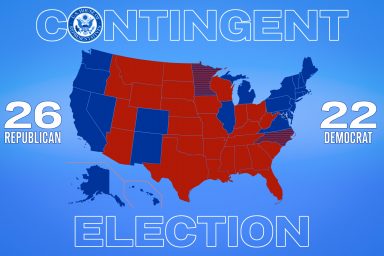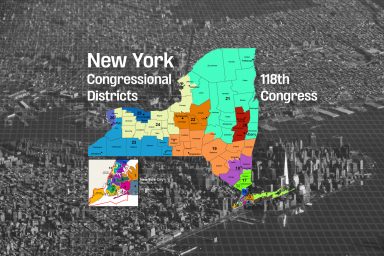People rank their top three choices for a lot of things: which place has better coffee, which road has the least traffic. What if we did that for congressional races too?

Iowa Democrats wanted to modernize their caucuses and expand access. Instead, problems with a mobile app and many other issues forced the party to delay announcing the winner.
But what is an embarrassment for state Democrats might be a win for democracy. For some election integrity advocates, the mess in Iowa was the perfect example of why caucuses no longer work and need to be replaced.
Troy Price, head of the Iowa Democratic Party, officially called for an independent investigation to determine what happened on caucus night. To some, however, the answer is clear and a solution obvious. Had the Iowa caucus been conducted through ranked-choice voting on paper ballots, argued Neal Simon, an Independent who ran for the US Senate in Maryland in 2018, election night would have been more “transparent, immediate, and private.”
The realignment process in Iowa — where voters can choose another candidate if their first option failed to meet the minimum threshold of votes — can sometimes occur two or three times. If voters were to walk into a polling place and immediately rank all of the candidates on paper, say ranked-choice voting advocates, a count would be done much faster since everyone will have already picked their second or third choices.
If Simon and fellow election integrity advocates have their way, the winner-take-all system in US congressional elections would be entirely replaced with ranked-choice voting. Advocates of this system argue their solution ends polarization and gerrymandering, thereby restoring civility to politics because candidates would need to appeal to their opponents’ supporters as a possible second choice.
In Cambridge, MA, for example, city council elections are conducted using multi-winner ranked-choice voting. From 2005 to 2011, the candidates’ policy platforms “were not polarized into two competing factions on major campaign issues,” according to a report by the nonpartisan group FairVote.
If a district has a three-winner race and uses ranked-choice voting, for example, voters would be electing three representatives instead of one. A candidate would have to reach a 25 percent threshold of the overall votes cast to win; any additional votes above that threshold are proportionally counted toward those voters’ second and third choices until every seat has been filled.
However, if no candidate reaches 25 percent, then the candidate with the fewest votes is considered defeated and his or her votes are proportionally assigned to voters’ second choices. Likewise, the elimination process would continue until three seats are filled. In some cases, districts could have four or five members. While the process stays the same for voters, the calculations change to determine the threshold for first place. Note that this process continues without any need for voters to be present; they can leave the polling place as soon as they fill out a ballot.
“So thank you to the Democratic Party in Iowa,” Simon joked during a symposium at New York University’s Washington campus on February 4. The event was convened by FairVote and the Election Reformers Network.
Proportional Representation
Just over a dozen cities throughout the country use ranked-choice voting, and some use it for overseas voters. Nevada Democrats are scrapping their plan to use the same app as Iowa and early voters there will use ranked-choice voting in lieu of a caucus. Maine is the only state to use ranked-choice voting in all elections, and New York City will be the largest municipality in the country to vote this way, starting in 2021. But the Fair Representation Act would go one step further.
More than 85 percent of congressional races were also considered “safe” for the incumbent party during the 2016 election, which means that most congressional votes cast do not make a difference. So, the idea is to replace the current electoral system with multi-member districts drawn by independent redistricting commissions. Election integrity advocates are calling it “a Congress for everyone.”
Is Ranked Choice Voting the Fix for a Broken Primary System?
Don’t Throw Away Your Vote: Ranked-Choice Elections Gather Momentum
The legislation’s goal is to create proportional representation based on population. Congress would keep the 435 seats in the House of Representatives in place, but maps would be drawn so several members of Congress represent a particular district.
Pedro Hernandez, senior policy coordinator with FairVote, compared the ranked-choice voting process to spreading your fixed household budget money among several options.
“If I have a dollar and my candidate is worth 90 cents, then I have 10 cents to spend on my second choice,” Hernandez said during last week’s symposium.
Virginia Democrat Rep. Don Beyer reintroduced the Fair Representation Act last year after the Supreme Court decided that ruling on partisan gerrymandering was out of its reach.
“I was really skeptical … but it kept stirring around in my head about how it’s a really good idea,” Beyer said about how he came to introduce the legislation.
The breakthrough moment for Beyer was when his youngest daughter, a political science student, asked him about proportional representation. Beyer argued that the Fair Representation Act would do away with gerrymandering “in one fell swoop.”
In Australia, voters already use ranked-choice voting. For Ruth Greenwood, who grew up in Australia and is now the co-director of the Campaign Legal Center’s voting rights and redistricting program in Boston, it simply makes the most sense for American voters to do the same. Ranked-choice voting, she added, would improve representation for historically disenfranchised communities.
The Fair Representation Act would also ensure that every voter in Iowa has their voice heard without impeding voters’ daily lives. FairVote condemned the state Democratic Party’s handling of its caucuses after party leaders could not provide campaigns and their supporters with a winner at the end of the night. Almost 24 hours passed before just half of the Iowa results came in — and we may never know who truly came out ahead.
“[The] meltdown in Iowa presents a valuable opportunity to modernize the Iowa caucus while preserving its best qualities,” said David Daley, FairVote’s senior fellow. “We can fix this: It’s time for Iowa to embrace ranked-choice voting and to professionalize its election administration. A primary would allow all Iowans to vote without worrying about work, child care, or spending three hours in a caucus.”
Related front page panorama photo credit: Adapted by WhoWhatWhy from Phil Roeder / Flickr (CC BY 2.0).



